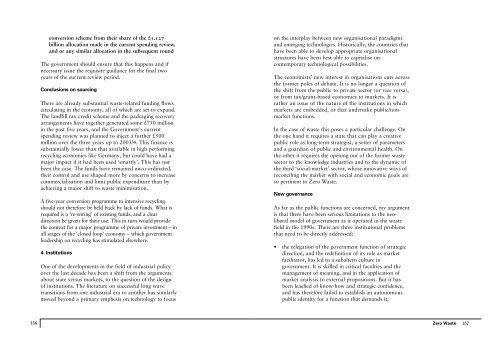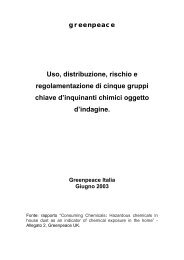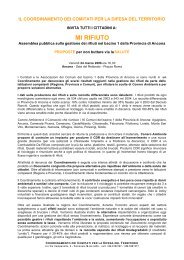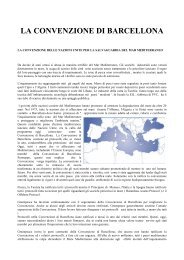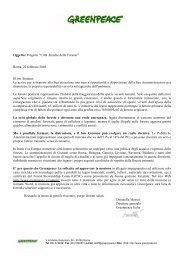Zero Waste by Robin Murray, Greenpeace Environmental Trust 2002
Zero Waste by Robin Murray, Greenpeace Environmental Trust 2002
Zero Waste by Robin Murray, Greenpeace Environmental Trust 2002
Create successful ePaper yourself
Turn your PDF publications into a flip-book with our unique Google optimized e-Paper software.
conversion scheme from their share of the £1.127<br />
billion allocation made in the current spending review,<br />
and or any similar allocation in the subsequent round<br />
The government should ensure that this happens and if<br />
necessary issue the requisite guidance for the final two<br />
years of the current review period.<br />
Conclusions on sourcing<br />
There are already substantial waste-related funding flows<br />
circulating in the economy, all of which are set to expand.<br />
The landfill tax credit scheme and the packaging recovery<br />
arrangements have together generated some £750 million<br />
in the past five years, and the Government’s current<br />
spending review was planned to inject a further £500<br />
million over the three years up to 2003/4. This finance is<br />
substantially lower than that available in high performing<br />
recycling economies like Germany, but could have had a<br />
major impact if it had been used ‘smartly’. This has not<br />
been the case. The funds have remained unco-ordinated,<br />
their control and use shaped more <strong>by</strong> concerns to increase<br />
commercialisation and limit public expenditure than <strong>by</strong><br />
achieving a major shift to waste minimisation.<br />
A five-year conversion programme to intensive re c y c l i n g<br />
should not there f o re be held back <strong>by</strong> lack of funds. What is<br />
re q u i red is a ‘re-wiring’ of existing funds, and a clear<br />
d i rection be given for their use. This in turn would pro v i d e<br />
the context for a major programme of private investment – in<br />
all stages of the ‘closed loop’ economy – which govern m e n t<br />
leadership on recycling has stimulated elsewhere.<br />
4. Institutions<br />
One of the developments in the field of industrial policy<br />
over the last decade has been a shift from the arguments<br />
about state versus markets, to the question of the design<br />
of institutions. The literature on successful long wave<br />
transitions from one industrial era to another has similarly<br />
moved beyond a primary emphesis on technology to focus<br />
on the interplay between new organisational paradigms<br />
and emerging technologies. Historically, the countries that<br />
have been able to develop appropriate organisational<br />
structures have been best able to capitalise on<br />
contemporary technological possibilities.<br />
The economists’ new interest in organisations cuts acro s s<br />
the former poles of debate. It is no longer a question of<br />
the shift from the public to private sector (or vice versa),<br />
or from tax/grant-based economies to markets. It is<br />
rather an issue of the nature of the institutions in which<br />
markets are embedded, or that undertake public/nonmarket<br />
functions.<br />
In the case of waste this poses a particular challenge. On<br />
the one hand it requires a state that can play a creative<br />
public role as long-term strategist, a setter of parameters<br />
and a guardian of public and environmental health. On<br />
the other it requires the opening out of the former waste<br />
sector to the knowledge industries and to the dynamic of<br />
the third ‘social-market’ sector, whose innovative ways of<br />
reconciling the market with social and economic goals are<br />
so pertinent to <strong>Zero</strong> <strong>Waste</strong>.<br />
New governance<br />
As far as the public functions are concerned, my argument<br />
is that there have been serious limitations to the neoliberal<br />
model of government as it operated in the waste<br />
field in the 1990s. There are three institutional problems<br />
that need to be directly addressed:<br />
• the relegation of the government function of strategic<br />
direction, and the redefinition of its role as market<br />
facilitator, has led to a subaltern culture in<br />
government. It is skilled in critical faculties and the<br />
management of meaning, and in the application of<br />
market analysis to external propositions. But it has<br />
been leached of know-how and strategic confidence,<br />
and has therefore failed to establish an autonomous<br />
public identity for a function that demands it;<br />
156<br />
<strong>Zero</strong> <strong>Waste</strong><br />
157


